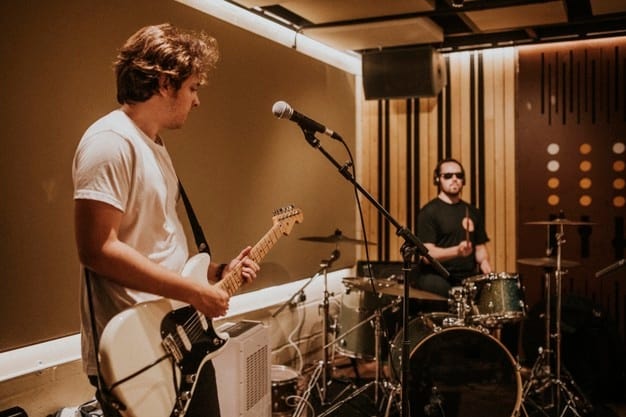For most guitar players, joining a band can be a tough issue. Most beginners think they should know more or they need to accomplish a high skill level to join or form a band.
Obviously, nobody wants to feel embarrassed and that’s why starters wonder if they need a specific set of abilities before being part of a band.
Although this could be an overwhelming, daunting experience, there are loads of people out there in the search of incorporating into a group.
But what every beginner wants to know is, how long should I play guitar before joining a band? Well, it always depends.
The best time to join a band is whenever you feel secure in your abilities and trust your playing. Some players develop their skills faster than others, and that can be because they put in the hours and practice a lot. It is not a matter of time, it is about how comfortable you feel with your instrument.
You may think you need abundant experience, and that’s true but there are more alternatives.
Players with just a handful of experience can start playing with more experienced musicians to get the hang of it. What is more, you can form your own group, there have always been bands of rookies.
Through this article, I will try to guide you to have a better understanding of what to do if you want to join a band.
Is your main goal to join a band?
It is important to set up your goals and prioritize tasks to achieve what you want. If your objective is to join a band, try to get into it from the very beginning.
If you have never been in a group it is great to play with people at the same skill level.
In that way, you will be accustomed to playing with other musicians which is wonderful for practice.
Besides, it is important to take into account that the more you interact with other players, the more you can learn from them.
I suggest joining as many musicians as you can.
Can you play over a backing track and not get lost?
Through the Internet, you can find excellent tools useful for practice (from videos of any kind to tabs of any song). One of the best types is backing tracks.
This is important because if you can play along the backing track, you are more likely to handle a rehearsal with other musicians.
Backing tracks are perfect to get used to playing a whole song and following a specific tempo.
However, you need to be careful because if your bandmates get lost, it will be nearly impossible.
At first, this could be a usual thing and it depends on everyone’s experience.
Just how experienced are your bandmates?
The people in your surroundings always influence you. The same happens when you join or form a band.
Being a beginner, it won’t be hard for you to incorporate a group of experienced musicians. If your bandmates are absolute pros, they will be able to carry you.
Besides, you will learn a lot more and faster about your instrument. Although it will be a really enjoyable experience, this is not the typical case.
When you create a band, the average scenario is that your bandmates are at the same level as you.
In the beginning, you will sound awful but if you practice you will learn the needed skills.
Are you starting a band with your friends or do you want to play with strangers?
Most well-known bands were formed among friends who reunite to play and have fun. However, some groups take this more seriously and act as professionals.
So, it is not the same to start a band with friends that playing with strangers. Friends are usually more permissive when taking a starter into a band.
This means that you won’t require extended advanced skills to be part of your friend’s band.
What is more, you have a previous relationship with the members which is useful to get on well with them.
On the other hand, strangers won’t probably accept a player who doesn’t suit their expectations.
As you are just beginning, I recommend you not to have your hopes too high, just focus on learning and acquiring experience.
4 fundamental skills you need before joining a band
To become part of a band is not an easy task.
You may think that if you know how to play your instrument you will be capable of joining a group but it is not only about playing some songs.
There are also relevant aspects that are required:
1. You need knowledge as regards music notation
Although some famous musicians knew little about this, it is a really important feature to develop.
For instance, identifying notes through the guitar’s neck is noticeable useful when you are composing pieces with your group.
Otherwise, you will be completely lost when your bandmate comes up with a new idea for a song.
Of course, your partners can teach you but it will be a lot better if you already know about this aspect.
2. Rhythm and tempo are two of the main points in the music
When you play on your own, alone in your bedroom it is easier to stick to a tempo but when you are in a rehearsal or even playing live you have to follow the band’s tempo.
This is one of the most difficult aspects of joining a band, it will take some time but the more you play, the faster you will learn.
3. Join a band only if you have your own instrument and you can practice at home
This may sound silly, but I have played with drummers that didn’t have a drum set at home so they couldn’t practice songs before the group’s rehearsals.
That is harmful to the band and for you as well. Remember that you are making a commitment so, if you don’t have the instrument you play, don’t be part of a band.
4. Try to get personal equipment, mainly an amp
Yeah, I know Hendrix at first was broke and borrowed guitars all the time, but you are not Jimi.
If your goal is to play live at the stage, you must have your own gear.
In another way, you will have to look for or borrow an amp every time you are going to give a concert.
What is more, your sound will never be consistent if you are using different equipment when you perform live.
How to approach a band you want to join
When you want to approach a band to join, you need to think of two basic aspects: honesty and humility.
No one can stand a vain musician who wants to show how good is him or her.
When approaching a group try to be humble, ask about their expectations and what are they looking for.
Besides, you can also ask if they have recorded material to listen to.
Be honest about yourself, make sure that they know what are your strengths and weaknesses.
To show your abilities, you can film or record yourself playing beforehand, that material will work as a sample of your skills.

Hello there, my name is Ramiro and I’ve been playing guitar for almost 20 years. I’m obsessed with everything gear-related and I thought it might be worth sharing it. From guitars, pedals, amps, and synths to studio gear and production tips, I hope you find what I post here useful, and I’ll try my best to keep it entertaining also.





